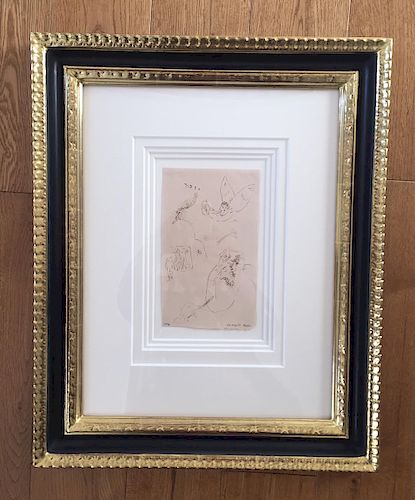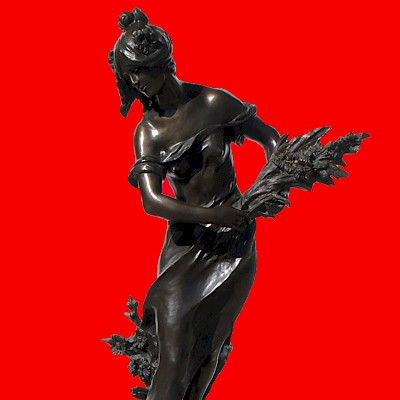Chagall, Marc, Russian/ French 1887-1985
Lot 159
Categories
Estimate:
$20,000 - $30,000
Absentee vs Live bid
Two ways to bid:
- Leave a max absentee bid and the platform will bid on your behalf up to your maximum bid during the live auction.
- Bid live during the auction and your bids will be submitted real-time to the auctioneer.
Bid Increments
| Price | Bid Increment |
|---|---|
| $0 | $10 |
| $100 | $25 |
| $500 | $50 |
| $1,000 | $100 |
| $2,000 | $250 |
| $5,000 | $500 |
About Auction
By Creighton-Davis Gallery
Nov 12, 2019
Set Reminder
2019-11-12 19:00:00
2019-11-12 19:00:00
America/New_York
Bidsquare
Bidsquare : November Close Out Sale of Fine and Decorative Art and Photographs
https://www.bidsquare.com/auctions/creighton-davis/november-close-out-sale-of-fine-and-decorative-art-and-photographs-4603
Creighton-Davis Gallery john.rareart@gmail.com
Creighton-Davis Gallery john.rareart@gmail.com
- Lot Description
Yizkor - La prier du souvenir(Yizkor - The prayer of remembrance), original drawing in brown ink on paper,1946, signed by the artist “Chagall, Paris” below right, dated below left, ,, ,Size info: ,sheet: 8.3 x 4.5 inches)214 x 130 cm) , , See website for additional data. Yizkor, inscribed on the drawing in Hebrew above left, is a special memorial prayer for the dead which is received in the synagogue four times a year following the Torah reading: on the last day of Passover, on the second day of Shavuot, on Shemini Atzeret and on Yom Kippur. Yizkor, in Hebrew, means �Remember�. It is not only the first word of the prayer, it also represents it�s overall theme. In this prayer, we implore God to remember the soul of our relatives and friends who have passed on.The drawing was made only one year after the end of the Second World War and doubtless reflects Chagall�s admiration and respect for a writer and scholar of Judaism. The Angel of the Lord can be seen above right. Perhaps the figures emerging from a door on the left are indeed those who should be remembered having perished in the Holocaust in the only too recent conflict. In 1946 all would have been aware of these tragic events.Small foxing spot central. Otherwise in good condition.., Ref: ,The Collection of Joseph Millner (Vice President of l’O.SE.E and member of l’association des ecrinains quiffs de France), by decent . Provenance: The Collection of Joseph Millner (Vice President of l�O.SE.E and member of l�association des ecrinains quiffs de France), by decent . This eminent figure was born in Chelm, Poland, in 1887. He studied Engineering and Chemistry in Switzerland prior to the First World War. In 1914 he was mobile in the Russian army to open a Chemistry laboratory in Moscow, In 1916 he met his wife, Ida Rastiger. His brother in law, Grisha Rastiger, was an activist in the Jewish Socialist movement which had been founded in Vilna in 1897. Joseph Millner participated in the founding of two Jewish newspapers, one in Hebrew and the other in Russian, both of which were proscribed in the October Revolution. Lenin described such things as separatism and contrary to the Nationalism he sought to create. Chelm, the city of the writers birth, was considered by Poles to be a place of caustic dry humour and his personality fitted these perceived descriptions. Despite this he was described as a �Bon Viveur�. He was a famous writer well known for witty sayings. and living in difficult times he was described by contemporaries as a �yiddishiste.
Condition
- Shipping Info
-
Please note that shipping is the responsibility of the buyer. Creighton-Davis will attempt to facilitate shipping whenever possible. However some items require specialized crating and shipping procedures which may only be offered by outside vendors. Creighton-Davis charges a minimum of $45.00 to prepare a lot for shipping which covers labor and materials so that the shipment arrives safely. Works retrieved at the gallery do not incur this charge.
-
- Buyer's Premium



 EUR
EUR CAD
CAD AUD
AUD GBP
GBP MXN
MXN HKD
HKD CNY
CNY MYR
MYR SEK
SEK SGD
SGD CHF
CHF THB
THB
















